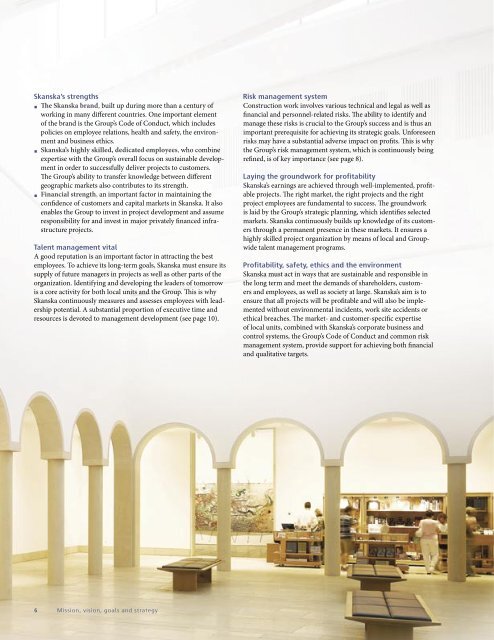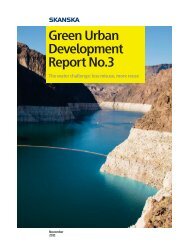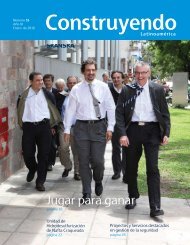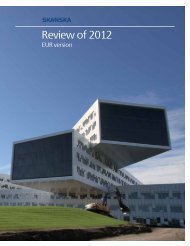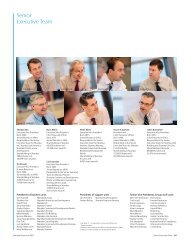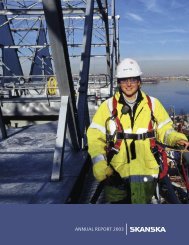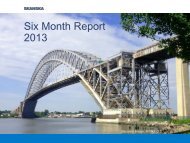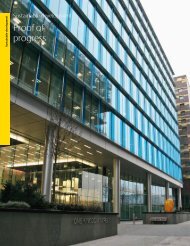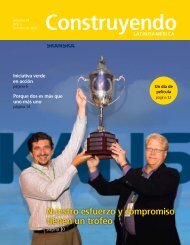ANNUAL REPORT 2006 - Skanska
ANNUAL REPORT 2006 - Skanska
ANNUAL REPORT 2006 - Skanska
You also want an ePaper? Increase the reach of your titles
YUMPU automatically turns print PDFs into web optimized ePapers that Google loves.
<strong>Skanska</strong>’s strengths<br />
• The <strong>Skanska</strong> brand, built up during more than a century of<br />
working in many different countries. One important element<br />
of the brand is the Group’s Code of Conduct, which includes<br />
policies on employee relations, health and safety, the environment<br />
and business ethics.<br />
• <strong>Skanska</strong>’s highly skilled, dedicated employees, who combine<br />
expertise with the Group’s overall focus on sustainable development<br />
in order to successfully deliver projects to customers.<br />
The Group’s ability to transfer knowledge between different<br />
geographic markets also contributes to its strength.<br />
• Financial strength, an important factor in maintaining the<br />
confidence of customers and capital markets in <strong>Skanska</strong>. It also<br />
enables the Group to invest in project development and assume<br />
responsibility for and invest in major privately financed infrastructure<br />
projects.<br />
Talent management vital<br />
A good reputation is an important factor in attracting the best<br />
employees. To achieve its long-term goals, <strong>Skanska</strong> must ensure its<br />
supply of future managers in projects as well as other parts of the<br />
organization. Identifying and developing the leaders of tomorrow<br />
is a core activity for both local units and the Group. This is why<br />
<strong>Skanska</strong> continuously measures and assesses employees with leadership<br />
potential. A substantial proportion of executive time and<br />
resources is devoted to management development (see page 10).<br />
Risk management system<br />
Construction work involves various technical and legal as well as<br />
financial and personnel-related risks. The ability to identify and<br />
manage these risks is crucial to the Group’s success and is thus an<br />
important prerequisite for achieving its strategic goals. Unforeseen<br />
risks may have a substantial adverse impact on profits. This is why<br />
the Group’s risk management system, which is continuously being<br />
refined, is of key importance (see page 8).<br />
Laying the groundwork for profitability<br />
<strong>Skanska</strong>’s earnings are achieved through well-implemented, profitable<br />
projects. The right market, the right projects and the right<br />
project employees are fundamental to success. The groundwork<br />
is laid by the Group’s strategic planning, which identifies selected<br />
markets. <strong>Skanska</strong> continuously builds up knowledge of its customers<br />
through a permanent presence in these markets. It ensures a<br />
highly skilled project organization by means of local and Groupwide<br />
talent management programs.<br />
Profitability, safety, ethics and the environment<br />
<strong>Skanska</strong> must act in ways that are sustainable and responsible in<br />
the long term and meet the demands of shareholders, customers<br />
and employees, as well as society at large. <strong>Skanska</strong>’s aim is to<br />
ensure that all projects will be profitable and will also be implemented<br />
without environmental incidents, work site accidents or<br />
ethical breaches. The market- and customer-specific expertise<br />
of local units, combined with <strong>Skanska</strong>’s corporate business and<br />
control systems, the Group’s Code of Conduct and common risk<br />
management system, provide support for achieving both financial<br />
and qualitative targets.<br />
6 Mission, vision, goals and strategy<br />
<strong>Skanska</strong> Annual Report <strong>2006</strong>


